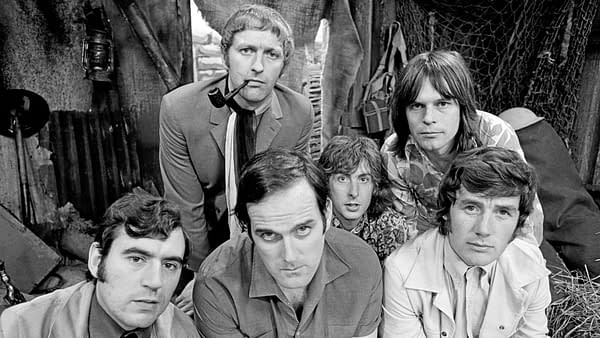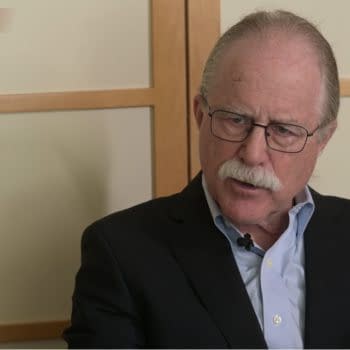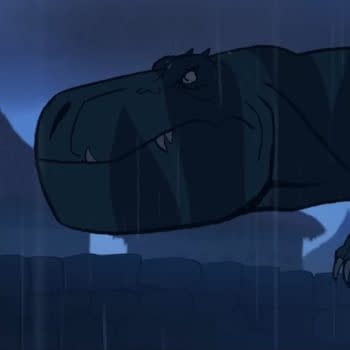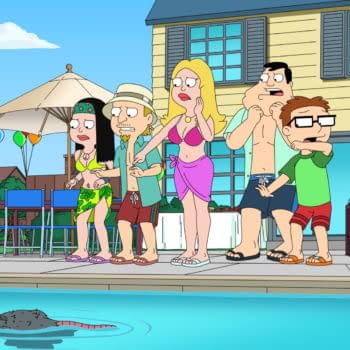Posted in: BBC, TV | Tagged: british comedy, eric idle, john cleese, monty python, terry jones
Monty Python: John Cleese Blames Us for Not Getting Eric Idle "Joke"
Regarding coverage of the Monty Python/Eric Idle spat, John Cleese claims his response was a "joke" and blamed the media for not getting it.
Article Summary
- John Cleese refers to media misinterpretation as missing the joke about Monty Python.
- Eric Idle's grievances with Cleese spark debate over bullying accusations.
- Cleese defends his Twitter humor, claiming the need for nuanced sarcasm.
- Comedians face challenges when conveying tone in print, sparking debate.
John Cleese declared to the world that the media got it all wrong when it widely reported on his tweet that was seemingly in response to fellow Monty Python member Eric Idle criticizing him for bullying the late Python Terry Jones and firing the last manager of the Python IP. Idle did not seem to be joking when he said he was happy that he hadn't seen Cleese for years and that he had had enough of doing anymore Python.

Cleese posted on X/Twitter that "We always loathed and despised each other, but it's only recently that the truth has begun to emerge", but that post had since been deleted the same day it went live, but not before multiple media outlets reported it, leading to the current Monty Python storm in a teacup.
"I've just seen the Press Association release," Cleese posted. "They got it totally wrong My remark about 'loathing and despising each other' 1. Referred to all the members of the group 2. Was a joke I would have expected PA staff to have 1. An understanding of irony 2. A sense of humour"
When someone pointed out that he could have added "/s" to indicate he was being sarcastic (which is still a terrible idea as it kills all nuance), Cleese responded, "Explaining a joke kills it. And … making a joke too obvious kills it too. The requirement for surprise means that the listener has to make a small mental leap to 'get' it. Too big a jump and they won't get it. Too little, and it becomes too obvious. Tricky."
If this is true and Cleese really was making a sarcastic joke, then he got the phrasing wrong and messed it up. It is not the fault of readers – or his audience – to take what he wrote at face value. To be clearer, he could have written, "The Pythons always loathed and despised each other, but it's only recently that the truth has begun to emerge." That would have been clearer. Still not particularly funny and somewhat ambiguous, but less prone to being misunderstood. Cleese should know better than anyone that you need to get the tone and wording right to land a joke. This is a teaching moment for all comedians. Print does not capture tone, sarcasm or irony well unless very clearly specified.
Yes, here I am, not a comedian, armchair-refereeing, but I am an audience member, and it is not our fault if a joke fails and we don't think it's funny. Being funny is every comedian's ONE job. No comedian can be funny all the time, which is why they should workshop first drafts of their jokes before making them public.
As for Idle's charge that he bullied Terry Jones, Cleese posted, "Terry and I quarrelled about material all the time, and sometimes got very fed up with each other But that happens with creative people who care a lot about what they're doing We didn't quarrel about anything else"
And for the record, Cleese has publicly said for decades in interviews and books that he felt Jones was enormously talented.
Idle has also since written of Cleese, "I never said he wasn't funny. He was. Hilarious. 61 years."
Cleese ended by posting, "My thanks to The Standard for understanding my joke about the Pythons 'loathing and despising each other' On the other hand… Zero points to The Hollywood Reporter and the Press Association"














